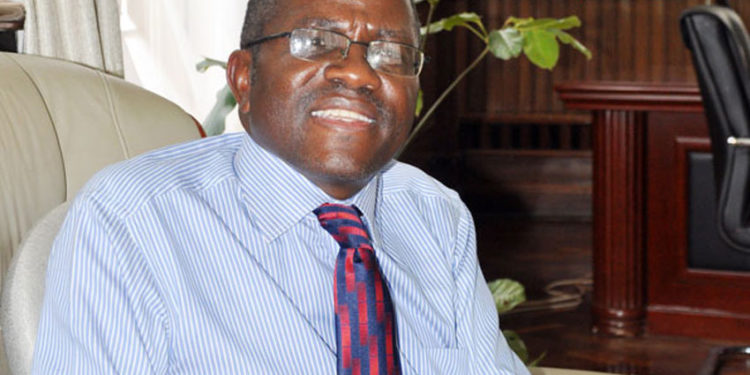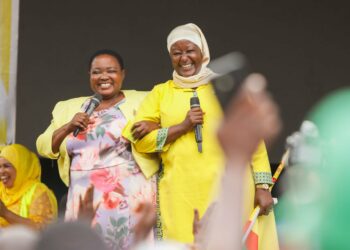On the 12th May, 2013 a royal proclamation, from Kabaka Ronald Muwenda Mutebi II, announcing my ascendency to the office of Katikkiro was made. I then became the fifth Katikkiro during his reign, to date, During the time of the Ssaabataka’s Supreme Council (the precursor to the Great Buganda Lukiiko), the late Joseph Patrick Musoke, carried out duties akin to those of the Katikkiro. Owek. Emannuel Ssendawula also carried out the same duties for about a year between the end of Katikkiro Daniel Muliika’s tenure and the beginning of that of Katikkiro John Baptist Walusimbi. I am, however, the fifth fully vested Katikkiro during Kabaka Mutebi’s reign. And today marks seven years since that royal proclamation.
In that time some modest achievements have been registered, and I trust we can all see them. A lot of activities have characterized these seven years, courtesy of the numerous programs we have initiated and implemented. I believe, again, that these too haven’t been missed, especially since the Kingdom is possessed of some formidable media outlets.
However, this seventh year of my Katikkiroship has witnessed a fundamental shift in the way Kingdom activities are carried out, ever since Kabaka Mutebi’s ascendency to the throne. In February, 2019, the Kabaka introduced full time serving ministers and scaled down their numbers. When I started my tenure, I had a cabinet of 25 strong ( that included the Katikkiro, the Speaker of the Buganda Lukiiko, and the Deputy Speaker). Under the current dispensation, and given the mandate of the Lukiiko, the Speaker and his deputy are members of the Kabaka’s cabinet. In 2019, the number was scaled down to 14, but with only seven ministries (nine ministers, including two ministers of state).
The purpose of trimming cabinet and bringing an end to volunteerism at the level of ministers was to ensure that ministers are paid a salary and/or allowances, to ensure that they give undivided attention to their tasks to maximize productivity for the development of the Kingdom. Ending volunteerism at the level of ministers is a fundamental shift because service to King and Kingdom had been on a volunteers’ basis since the Kabaka returned from exile in 1986. Significant accomplishments were made during all this time, but there can never be an optimal contribution, nor could Buganda realize her aspirational objectives, when one merely serves at one’s discretion, since service is on a volunteer basis.
Today, lots of work is being done, with new initiatives and/or renewal of hitherto relegated activities in the last seven years within the Kabaka’s government, and throughout the Kingdom’s seventeen organizations and companies. It is imperative that ministers work full time to superintend all these various activities. In all we do, we are guided by the Kingdom’s Five Aspirational Objectives which, when taken together, sum up the overall vision of the Kingdom. Let me summarize those Objectives: Protection and Preservation of the Cultural Heritage of Buganda including the Sanctity of the Occupant of her Throne; Sharing Power Through a Federal System of Government; Protection of all Kingdom Lands including the Sanctity of Her Borders; Production and Service Delivery (this includes health; education; job creation and general development themes); and Promotion of Unity.
It is high time we placed emphasis on quality output, from all our undertakings, given that it’s nearly 27 years since Kabaka Mutebi ascended the throne. We, therefore, must have a team of ministers who play a full-time oversight function over the activities that uplift the economic and social wellbeing of the people of Buganda. We now purposefully aspire for a federal system of government. That has been our aim all along, but with a full time serving cabinet, we have begun to walk the talk. As we embark on this fundamental new paradigm shift we draw inspiration from the Kingdom restoration process. When the Kabaka (then a prince) returned from exile and went about his role of re-assembling the organs of his Kingdom, his conduct was a far cry for the restoration of the monarchy – at the legal front.
We, therefore, set ourselves the task of running a government akin to what we aspire to have under a federal system, and whoever thinks this is mere tokenism will be disabused of that inclination by history. Serving on a volunteer basis is till in use, and still useful. The County Chiefs and other layers of chiefs; members of boards and committees render their services (highly valuable and appreciated) on a volunteer basis. But we have plans of gradually addressing this, in order to maximize the full potential of all those who are honorable enough to render selfless service without pay. However, the rest of our staffers in our organizations and companies are full time paid employees.
Since the new changes in the cabinet, slightly over a year ago now, commendable improvement in service delivery has been experienced and I am truly hopeful that the best is yet to come. That is on the premise that we continue serving on the basis of the method of work we crafted at the very beginning of my tenure, which we describe as the New Work Ethic, and it includes Four Tenets: Innovativeness; Tenacity; Transparency; and Passion (carrying out our duties with full commitment).
The journey into my eighth year as Katikkiro starts at a time when the entire world has been brought on its knees by the Coronavirus Pandemic (COVID 19). Firstly, we must not lose hope, notwithstanding the challenges many are faced with, especially due to scarcity or lack of food. Secondly, we must stay safe. This means we must comply by all the guidelines set by the government and the Ministry of Health.
Whereas this Pandemic creates a very difficult episode in our lives, I believe that we shall be able to recover from its effects sooner than feared. This is so because at every end of a crisis there’s always a surge in demand for goods and services. When countries suffer wars, production is decimated or halted altogether. When the war is over and production starts, the products find very thirsty markets. I will give the example of schools; when they finally re-open, there will be a huge demand for food; those working in areas of recreation or the entertainment industry are likely to make a killing too (the breweries; the bars; the artists and performers; the foods and snacks vendors will all be making impressive sales); the IT specialist are also likely to be highly sought after, given that whatever service remained going during the COVID 19 crisis was reliant on IT. I think that even after the virus is out of our way, individuals and companies are going to embrace IT and new technologies even more.
As I embark on my eighth year as premier, I appeal to all of you to prepare adequately for the after-COVID 19 (that’s what we’re doing now in all Kingdom organs and agencies), so that we resume our work and roles with renewed enthusiasm and a sense of purpose. Whoever owns a piece of land should plant some crops (never forget coffee); I urge those who are still in service to go about their work diligently, and to spare the little income that you realize. And each one of us should set him/herself goals to achieve as soon as the Lockdown is lifted.
I had planned to introduce my new book, ETTOFFAALI (it details the Ettoffaali campaign in full), in commemoration of my seven years in office but its publication was impeded by the Lockdown; immediately the stay home orders are lifted, copies will be in the book stores. I hope you will get yourselves copies, so you don’t miss out on the historic aspects of a campaign that created a definitive mind change in the people of Buganda (and Ugandans in general).
Finally, I would like to express my gratitude to His Majesty the Kabaka for supporting me in the execution of the duties that he was pleased that I shoulder. I commend my deputies and the ministers for never giving up, even if we are faced with challenges now and again. I thank all the County Chiefs, the chiefs below them and the Kingdom employees for working tirelessly to ensure we witness positive changes in Buganda. I appreciate the advice and counsel of the Clan Heads (Abataka).
I am very grateful and thankful for the cooperation and support of all leaders: political; religious and cultural, without which my work would be a lot harder.
I am always indebted to the ordinary people of Buganda who have stood by me on this noble, but tough, journey.
AYI KATONDA KUUMA KABAKA WAFFE!
The author is the Katikkiro of Buganda
Do you have a story in your community or an opinion to share with us: Email us at editorial@watchdoguganda.com













